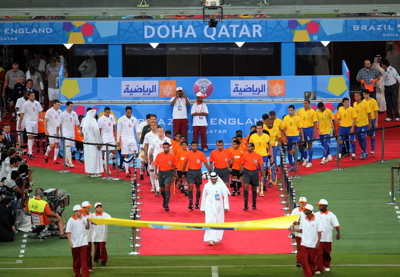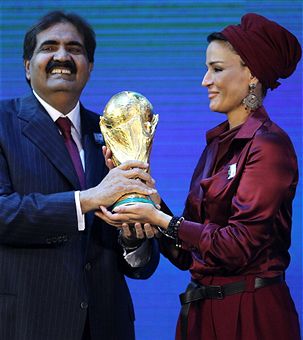By David Owen in Zurich
December 2 – Money, money, money – Qatar’s audacious yet hugely well-resourced bid could not have won the 2022 World Cup without it.
But nor could they have come out on top, by 14 votes to eight for the United States in the fourth and final round of voting, without getting value for money.
To give one example of which I have direct experience: the hydrocarbon-rich Gulf State must have spent a fortune shipping international journalists, including insideworldfootball, out to get a first-hand taste of what life was like there.
It needed to do this to undermine long-held stereotypes and demonstrate that its promise of air-conditioned stadiums was not pie-in-the-sky.
But the visits were well-organised, packed with content and not overly dictatorial.
Another example: the desert Emirate needed to demonstrate that it could host top-flight international football and that visiting foreign fans could have a good time there.
What did it do?
Laid on high-profile international friendlies pitting Brazil against first England then Argentina.
Once again, this must have cost a pretty riyal.

But it did the trick.
The glitz and razzmatazz of the bulk of its campaign, featuring Zinedine Zidane and others, has been well documented.
So it was a surprise that its meticulously prepared presentation in Zurich was so serious-minded.
A surprise, as I say, but a welcome one.
This gave a new twist to a trick deployed by Rio de Janeiro last year in Copenhagen when it won the right to stage the 2016 Summer Olympics against a strong field.
We arrived in Denmark expecting a celebration of the Brazilian city’s reputation as a party town.
What we got was the Governor of the Central Bank of Brazil.
Here, the surprise package was an unknown 24-year-old Iraqi called Mohammed Al-Nufal Al Tamimi who explained the effect on his troubled country of the national team’s astonishing victory in the 2007 Asian Cup.
The presentation also scored well by not shying away from potentially delicate issues such as Israel and women’s rights.
And its attention to detail was exemplary.
Bid Committee chief executive Hassan Al-Thawadi delivered much of his contribution in Spanish in a gesture that no doubt went down very well with the FIFA Executive Committee’s numerous Hispanic contingent.
Ditto an imaginary football match in a presentation video that happened to feature the national team of Qatar against Argentina.
Perhaps most remarkable of all was that Qatar won in spite of having its plans to play the World Cup there in June and July branded “a potential health risk” by FIFA inspectors.
Discussions immediately after the result indicate that the country has not laid to rest all the FIFA top brass’s qualms regarding the region’s extreme heat.
And there is a risk that by awarding Qatar the World Cup regardless, world football’s governing body might destroy the credibility of its own evaluation process.
But there is also a feeling that there is a long time to go before 2022 and, having come out on top in the vote, Qatar should be given breathing-space to show what it can do.
Having endured disappointment at its failure to land the 2016 Olympics, this tiny country has now been recompensed many times over.
By any measure, it is an astounding victory.
Contact the writer of this story at zib.l1744834023labto1744834023ofdlr1744834023owedi1744834023sni@n1744834023ewo.d1744834023ivad1744834023
Related stories
December 2010: Tiny Qatar awarded 2022 World Cup
December 2010: Qatar turns up the heat by asking: “When?”
November 2010: Battle of the stats for 2022 World Cup
November 2010: Qatar World Cup would be worth “billions” they claim
November 2010: US has short memory about high temperatures, claims Bin Hammam

